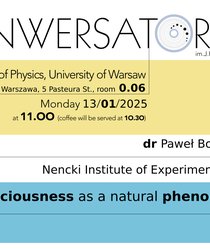The upcoming Konserwatorium im. Jerzego Pniewskiego i Leopolda Infelda will take place on Monday, January 13, 2025, at 11:00 AM in Room 0.06 at the Faculty of Physics, University of Warsaw.
The lecture titled:
"Consciousness as a Natural Phenomenon"
Dr. Paweł Boguszewski
(Nencki Institute of Experimental Biology, Warsaw)
The debate on the nature of human consciousness and how it should be studied is ongoing. This issue lies at the intersection of philosophy and empirical sciences. During the lecture, we will explore the neurobiological approach to understanding the phenomenon referred to as consciousness.
The lecture will be conducted in English.
Before the Colloquium, starting at 10:30 AM, we invite you to informal discussions over coffee and cake in the hall outside Room 0.06.
Barbara Badełek
Jan Chwedeńczuk
Jan Kalinowski
Jan Suffczyński
Abstract:
For millennia, humans have grappled with questions we might call fundamental: What makes us human? What is reality? What is consciousness? Of these, the last question continues to elude our cognitive grasp. Despite centuries of contemplation by philosophers, theologians, and scientists, we remain incapable not only of explaining the nature of consciousness but even of reaching a consensus on its definition. Modern neuroscience has identified as one of its foremost goals the investigation of how a biological entity, shaped by billions of years of natural evolution, generates consciousness. This emerging field, rooted in biology and firmly anchored in scientific methodology, holds promise for addressing this profound question—or at least for refining the definitions and formulating more precise inquiries. The neuroscientific approach combines theoretical hypothesis testing with meticulous experimental methods, directly studying the brains of humans and animals using state-of-the-art technologies. Along the way, it confronts a host of other significant questions: the uniqueness of the species Homo sapiens, the existence of consciousness or proto-consciousness in animals, and even the possibility of its creation in computational systems. By following this path, we may inch closer to answering humanity's most enduring question: who we truly are.

